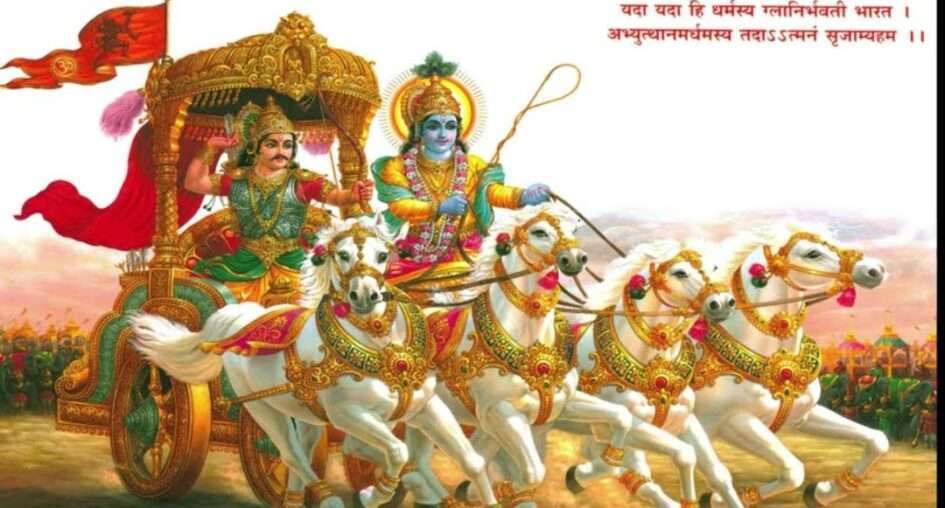Discerning the Body and the Soul
In Chapter 13, Lord Krishna elucidates the distinction between the perishable body and the imperishable soul. He emphasizes the eternal nature of the soul, which transcends physical existence. Krishna highlights the importance of discerning between the two and understanding the true essence of the self, leading to self-realization and liberation from the cycle of birth and death.
श्रीभगवानुवाच
इदं शरीरं कौन्तेय क्षेत्रमित्यभिधीयते।
एतद्यो वेत्ति तं प्राहुः क्षेत्रज्ञ इति तद्विदः ॥ १॥
sri bhagavaan uvaacha
idam shareeram kaunteya kshetramityabhidheeyate
etadyo vetti tam praahuh kshetrajna iti tadvidah
Śrī Bhagavān said : This body, Arjuna is termed as the Field (Ksetra) and he who knows it, is called the knower of the Field (Ksetrajña) by the sages discerning the truth about both.(1)

Embrace the Bhagavad Gita’s transformative power and unlock a path to a purposeful, balanced, and fulfilling life.
क्षेत्रज्ञं चापि मां विद्धि सर्वक्षेत्रेषु भारत।
क्षेत्रक्षेत्रज्ञयोर्ज्ञानं यत्तज्ज्ञानं मतं मम ॥२॥
kshetrajnam chaapi maam viddhi sarvakshetreshu bhaarata
kshetrakshetrajnayor jnaanam yattajjnaanam matam mama
Know Myself to be the Kșetrajña (individual soul) in all the Ksetras (fields), Arjuna. And it is the knowledge of the field (Ksetra) and knower (Ksetrajna) (i.e., of Matter with its evolutes and the Spirit) which I consider as true knowledge.(2)
तत्क्षेत्रं यच्च यादृक्च यद्विकारि यतश्च यत्।
स च यो यत्प्रभावश्च तत्समासेन मे शृणु ॥ ३॥
tat kshetram yaccha yaadrikcha yadvikaari yatashcha yat
sa cha yo yatprabhaavashcha tatsamaasena me shrinu
What that Field (Ksetra) is and what is its nature, what are its modifications, and from what causes what effects have arisen, and also who its knower (Ksetrajña) is, and what is His glory—hear all this from Me in brief (3)
ऋषिभिर्बहुधा गीतं छन्दोभिर्विविधैः पृथक् ।
ब्रह्मसूत्रपदैश्चैव हेतुमद्भिर्विनिश्चितैः ॥ ४॥
rishibhirbahudhaa geetam chhandobhirvividhaih prithak
brahmasootrapadaishchaiva hetumadbhirvinishchitaih
The truth about the Kșetra and the Kșetrajña has been expounded by the seers in manifold ways; again, it has been separately stated in different Vedic chants and also in the conclusive and reasoned texts of the Brahmasutras.(4)
महाभूतान्यहङ्कारो बुद्धिरव्यक्तमेव च।
इन्द्रियाणि दशैकं च पञ्च चेन्द्रियगोचराः ॥५॥
mahaabhootaanyahankaaro buddhiravyaktameva cha
indriyaani dashaikam cha pancha chendriyagocharaah
The five elements, the ego, the intellect, the Unmanifest (Primordial Matter), the ten organs of perception and action, the mind, and the five objects of sense (sound, touch, colour, taste and smell).(5)
इच्छा द्वेषः सुखं दुःखं सातश्चेतना धृतिः।
एतत्क्षेत्रं समासेन सविकारमुदाहृतम् ॥ ६॥
icchaa dweshah sukham duhkham sanghaatashchetanaa dhritih
etat kshetram samaasena savikaaramudaahritam
Also desire, aversion, pleasure, pain, the physical body, consciousness, firmness: thus is the Ksetra, with its evolutes, briefly stated.(6)
अमानित्वमदम्भित्वमहिंसा क्षान्तिरार्जवम्।
आचार्योपासनं शौचं स्थैर्यमात्मविनिग्रहः ॥ ७॥
amaanitwam adambhitwam ahimsaa kshaantiraarjavam
aachaaryopaasanam shaucham sthairyamaatmavinigrahah
Absence of pride, freedom from hypocrisy, nonviolence, forbearance, uprightness of speech and mind etc., devout service of the preceptor, internal and external purity, steadfastness of mind and control of body, mind and the senses; (7)
इन्द्रियार्थेषु वैराग्यमनहङ्कार एव च।
जन्ममृत्युजराव्याधिदुःखदोषानुदर्शनम् ॥ ८ ॥
indriyaartheshu vairaagyamanahankaara eva cha
janma mrityu jaraa vyaadhi duhkha doshaanu darshanam
Dispassion towards the objects of enjoyment of this world and the next, and also absence of egotism, pondering again and again on the pain and evils inherent in birth, death, old age and disease; (8)
असक्तिरनभिष्वङ्गः पुत्रदारगृहादिषु।
नित्यं च समचित्तत्वमिष्टानिष्टोपपत्तिषु ॥ ९ ॥
asaktiranabhishwangah putradaaragrihaadishu
nityam cha samachittatwam ishtaanishtopapattishu
Absence of attachment and the sense of mineness in respect of son, wife, home etc., and constant equipoise of mind both in favourable and unfavourable circumstances;
मयि चानन्ययोगेन भक्तिरव्यभिचारिणी।
विविक्तदेशसेवित्वमरतिर्जनसंसदि ॥ १०॥
mayi chaananyayogena bhaktiravyabhichaarinee
viviktadesha sevitwam aratir janasamsadi
Unflinching devotion to Me through exclusive attachment, living in secluded and holy places, and finding no delight in the company of worldly people;(10)
अध्यात्मज्ञाननित्यत्वं तत्त्वज्ञानार्थदर्शनम्।
एतज्ज्ञानमिति प्रोक्तमज्ञानं यदतोऽन्यथा॥११॥
adhyaatma jnaana nityatwam tattwa jnaanaartha darshanam
etajjnaanamiti proktam ajnaanam yadatonyathaa
Constancy in self-knowledge and seeing God as the object of true knowledge—all this is declared as knowledge, and what is contrary to this is called ignorance.(11)
ज्ञेयं यत्तत्प्रवक्ष्यामि यज्ज्ञात्वामृतमश्नुते।
अनादिमत्परं ब्रह्म न सत्तन्नासदुच्यते ॥ १२॥
jneyam yattat pravakshyaami yajjnaatwaamritam ashnute
anaadimatparam brahma na sattannaasaduchyate
I shall speak to you at length about that which ought to be known, and knowing which one attains supreme Bliss. That supreme Brahma, who is the lord of beginningless entities, is said to be neither Sat (being) nor Asat (non-being). (12)
सर्वतः पाणिपादं तत्सर्वतोऽक्षिशिरोमुखम्।
सर्वतः श्रुतिमल्लोके सर्वमावृत्य तिष्ठति ॥ १३॥
sarvatah paanipaadam tat sarvato’kshishiromukham
sarvatah shrutimalloke sarvamaavritya tishtathi
It has hands and feet on all sides, eyes, head and mouth in all directions, and ears all-round; for it stands pervading all in the universe. (13)
सर्वेन्द्रियगुणाभासं सर्वेन्द्रियविवर्जितम्।
असक्तं सर्वभृच्चैव निर्गुणं गुणभोक्तृ च॥ १४॥
sarvendriyagunaabhaasam sarvendriyavivarjitam
asaktam sarvabhricchaiva nirgunam gunabhoktru cha
Though perceiving all sense-objects, it is really speaking devoid of all senses. Nay, though unattached, it is the sustainer of all nonetheless; and though attributeless, it is the enjoyer of Gunas, the three modes of Prakrti.(14)
बहिरन्तश्च भूतानामचरं चरमेव च।
सूक्ष्मत्वात्तदविज्ञेयं दूरस्थं चान्तिके च तत् ॥ १५॥
bahirantashcha bhootaanaam acharam charameva cha
sookshmatwaat tadavijneyam doorastham chaantike cha tat
It exists without and within all beings, and constitutes the animate and inanimate creation as well. And by reason of its subtlety, it is incomprehensible; it is close at hand and stands afar too.(15)
अविभक्तं च भूतेषु विभक्तमिव च स्थितम्।
भूतभर्तृ च तज्ज्ञेयं ग्रसिष्णु प्रभविष्णु च॥ १६॥
avibhaktam cha bhooteshu vibhaktamiva cha sthitam
bhootabhartru cha tajjneyam grasishnu prabhavishnu cha
Though integral like space in its undivided aspect, it appears divided as it were, in all animate and inanimate beings. And that Godhead, which is the only object worth knowing, is the sustainer of beings (as Visnu), the destroyer (as Rudra) and the creator of all (as Brahma).(16)
ज्योतिषामपि तज्योतिस्तमसः परमुच्यते।
ज्ञानं ज्ञेयं ज्ञानगम्यं हृदि सर्वस्य विष्ठितम्॥ १७॥
jyotishaamapi tajjyotistamasah paramuchyate
jnaanam jneyam jnaanagamyam hridi sarvasya vishthitam
That supreme Brahma is said to be the light of all lights and entirely beyond Māyā. That godhead is knowledge itself, worth knowing, and worth attaining through real wisdom, and is particularly abiding in the hearts of all.(17)
इति क्षेत्रं तथा ज्ञानं ज्ञेयं चोक्तं समासतः।
मद्भक्त एतद्विज्ञाय मद्भावायोपपद्यते ॥ १८ ॥
iti kshetram tathaa jnaanam jneyam choktam samaasatah
madbhakta etadvijnaaya madbhaavaayopapadyate
Thus the truth of the Kșetra and knowledge, as well as of the object worth knowing, i.e., God has been briefly discussed; knowing this in reality, My devotee enters into My being. (18)
प्रकृतिं पुरुषं चैव विद्ध्यनादी उभावपि।
विकारांश्च गुणांश्चैव विद्धि प्रकृतिसम्भवान् ॥१९॥
prakritim purusham chaiva viddhyanaadee ubhaavapi
vikaaraamshcha gunaamshchaiva viddhi prakritisambhavaan
Prakrti and Purusa, know both these as beginningless. And know all modifications such as likes and dislikes etc., and all objects constituted of the three Gunas as born of Prakrti.(19)
कार्यकरणकर्तृत्वे हेतुः प्रकृतिरुच्यते।
पुरुषः सुखदुःखानां भोक्तृत्वे हेतुरुच्यते ॥ २०॥
kaaryakaaranakartrutwe hetuh prakritiruchyate
purushah sukhaduhkhaanaam bhoktritwe heturuchyate
Prakrti is said to be responsible for bringing forth the evolutes and the instruments; while the individual soul is declared to be responsible for the experience of joys and sorrows. (20)
पुरुषः प्रकृतिस्थो हि भुङ्क्ते प्रकृतिजान्गुणान्।
कारणं गुणसङ्गोऽस्य सदसद्योनिजन्मसु ॥ २१॥
purushah prakritistho hi bhungte prakritijaan gunaan
kaaranam gunasango’sya sadasadyoni janmasu
Only the Purușa in association with Prakrti experiences objects of the nature of the three Gunas evolved from Prakrti and it is attachment with these Gunas that is responsible for the birth of this soul in good and evil wombs. (21)
उपद्रष्टानुमन्ता च भर्ता भोक्ता महेश्वरः।
परमात्मेति चाप्युक्तो देहेऽस्मिन्पुरुषः परः ॥ २२॥
upadrashtaanumantaa cha bhartaa bhoktaa maheshwarah
paramaatmeti chaapyukto dehe’smin purushah parah
The Spirit dwelling in this body, is really the same as the Supreme. He has been spoken of as the Witness, the true Guide, the Sustainer of all, the Experiencer (as the embodied soul), the Overlord and the Absolute as well. (22)
य एवं वेत्ति पुरुषं प्रकृतिं च गुणैः सह।
सर्वथा वर्तमानोऽपि न स भूयोऽभिजायते ॥ २३॥
ya evam vetti purusham prakritim cha gunaih saha
sarvathaa vartamano’pi na sa bhooyobhijaayate
He who thus knows the Purusa (Spirit) and Prakrti (Nature) together with the Gunas-even though performing his duties in everyway, is not born again.(23)
ध्यानेनात्मनि पश्यन्ति केचिदात्मानमात्मना।
अन्ये साख्येन योगेन कर्मयोगेन चापरे॥ २४॥
dhyaanenaatmani pashyanti kechidaatmaanamaatmanaa
anye saankhyena yogena karmayogena chaapare
Some by meditation behold the supreme Spirit in the heart with the help of their refined and sharp intellect; others realize it through the discipline of Knowledge, and still others, through the discipline of Action, i.e., Karmayoga. (24)
अन्ये त्वेवमजानन्तः श्रुत्वान्येभ्य उपासते।
तेऽपि चातितरन्त्येव मृत्युं श्रुतिपरायणाः॥ २५ ॥
anye twevamajaanantah shrutwaanyebhya upaasate
te’pi chaa’titarantyeva mrityum shrutiparaayanaah
Other dull-witted persons, however, not knowing thus, worship even as they have heard from others; and even those who are thus devoted to what they have heard, are able to cross the ocean of mundane existence in the shape of death(25)
यावत्सञ्जायते किञ्चित्सत्त्वं स्थावरजङ्गमम्क्षेत्रक्षेत्रज्ञसंयोगात्तद्विद्धि भरतर्षभ ॥२६॥
yaavat sanjaayate kinchit sattwam sthaavarajangamam
kshetrakshetrajnasamyogaat tadviddhi bharatarshabha
Arjuna, whatsoever being, the moving or unmoving, is born, know it as emanated through the union of Ksetra (Matter) and the Ksetrajna (Spirit). (26)
समं सर्वेषु भूतेषु तिष्ठन्तं परमेश्वरम्।
विनश्यत्स्वविनश्यन्तं यः पश्यति स पश्यति ॥ २७॥
samam sarveshu bhooteshu tishthantam parameshwaram
vinashyatswavinashyantam yah pashyati sa pashyati
He alone truly sees, who sees the supreme Lord as imperishable and abiding equally in all perishable beings, both animate and inanimate. (27)
समं पश्यन्हि सर्वत्र समवस्थितमीश्वरम्।
न हिनस्त्यात्मनात्मानं ततो याति परां गतिम् ॥ २८॥
samam pashyan hi sarvatra samavasthitameeshwaram
na hinastyaatmanaatmaanam tato yaati paraam gatim
For, by seeing the Supreme Lord equally present in all, he does not kill the Self by himself, and thereby attains the supreme state. (28)
प्रकृत्यैव च कर्माणि क्रियमाणानि सर्वशः।
यः पश्यति तथात्मानमकर्तारं स पश्यति॥२९॥
prakrityaiva cha karmaani kriyamaanaani sarvashah
yah pashyati tathaatmaanam akartaaram sa pashyati
He who sees that all actions are performed in everyway by nature (Prakrti) and the Self as the non-doer, he alone verily sees.(29)
यदा भूतपृथग्भावमेकस्थमनुपश्यति।
तत एव च विस्तारं ब्रह्म सम्पद्यते तदा ॥ ३०॥
yadaa bhootaprithagbhaavam ekastham anupashyati
tata eva cha vistaaram brahma sampadyate tadaa
The moment man perceives the diversified existence of beings as rooted in the one supreme Spirit, and the spreading forth of all beings from the same, that very moment he attains Brahma (who is Truth, Consciousness and Bliss solidified). (30)
अनादित्वान्निर्गुणत्वात्परमात्मायमव्ययः ।
शरीरस्थोऽपि कौन्तेय न करोति न लिप्यते ॥ ३१॥
anaaditwaan nirgunatwaat paramaatmaayam avyayah
shareerasthopi kaunteya na karoti na lipyate
Arjuna, being without beginning and without attributes, this indestructible supreme Spirit, though dwelling in the body, in fact does nothing, nor gets tainted.(31)
यथा सर्वगतं सौम्यादाकाशं नोपलिप्यते।
सर्वत्रावस्थितो देहे तथात्मा नोपलिप्यते ॥ ३२॥
yataa sarvagatam saukshmyaadaakaasham nopalipyate
sarvatraavasthito dehe tathaatmaa nopalipyate
As the all-pervading ether is not contaminated by reason of its subtlety, though permeating the body, the Self is not affected by the attributes of the body due to Its attributeless character. (32)
यथा प्रकाशयत्येकः कृत्स्नं लोकमिमं रविः।
क्षेत्रं क्षेत्री तथा कृत्स्नं प्रकाशयति भारत ॥ ३३॥
yathaa prakaashayatyekah kritsnam lokamimam ravih
kshetram kshetree tathaa kritsnam prakaashayati bhaarata
Arjuna, as the one sun illumines this entire universe, so the one Atmā (Spirit) illumines the whole Ksetra (Field). (33)
क्षेत्रक्षेत्रज्ञयोरेवमन्तरंज्ञानचक्षुषा।
भूतप्रकृतिमोक्षं च ये विदुर्यान्ति ते परम्॥ ३४॥
kshetrakshetrjnayorevamantaram jnaanachakshushaa
bhootaprakritimoksham cha ye vidur yaanti te param
Those who thus perceive with the eye of wisdom the difference between the Ksetra and Ksetrajña, and the phenomenon of liberation from Prakrti with her evolutes, reach the supreme eternal Spirit.(34)
ॐ तत्सदिति श्रीमद्भगवद्गीतासूपनिषत्सु
ब्रह्मविद्यायां योगशास्त्रे श्रीकृष्णार्जुनसंवादे
क्षेत्रक्षेत्रज्ञविभागयोगोनाम त्रयोदशोऽध्यायः ॥ १३ ॥
om tat sat iti srimadbhagavadgeetaasu upanishatsu
brahma vidyaayaam yogashaastre sri krishnaarjuna samvaade
kshetra kshetrajna vibhaaga yogo naama trayodasho’dhyaayah ||
Thus, in the Upanisad sung by the Lord, the Science of Brahma, the scripture of Yoga, the dialogue between Sri Krsna and Arjuna, ends the thirteenth chapter entitled “The Yoga of discrimination between the Field and the Knower of the Field.





Leave a Reply